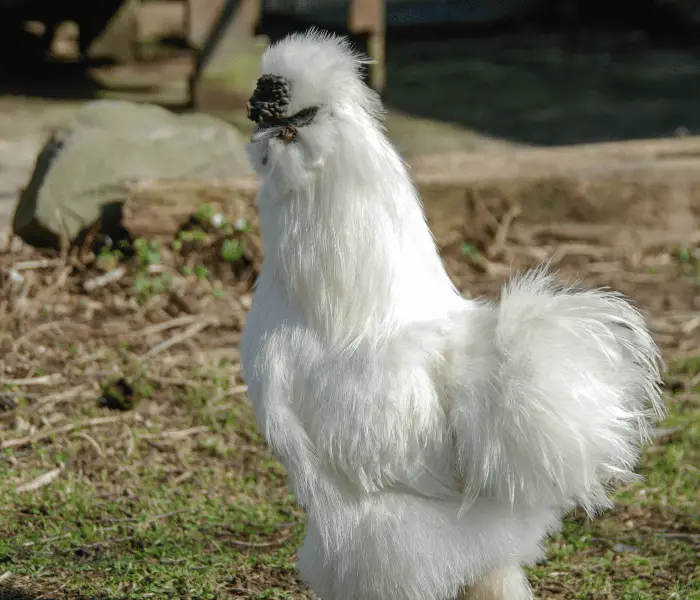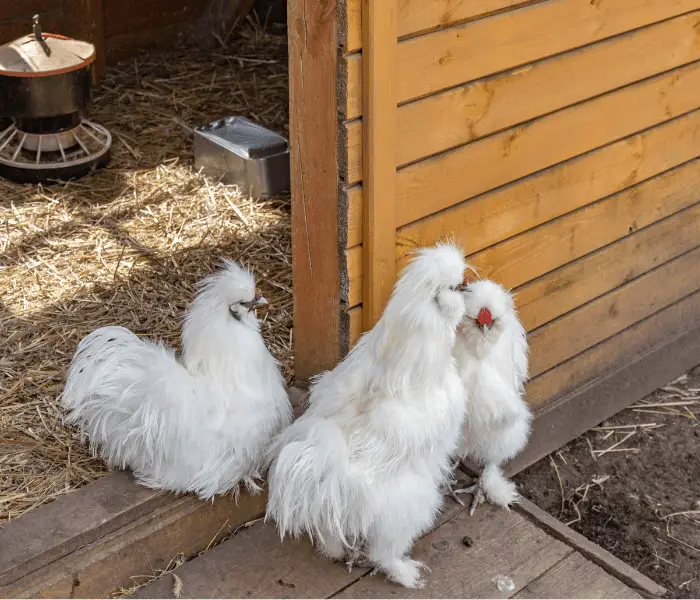
Silkie chicks are tough to sex until they reach sexual maturity, and often, owners end up raising cockerels alongside the Silkie hens and do not realize until the cockerel starts to crow. If you keep silkies, you will likely inevitably end up with a few surprise cockerels!
Silkie cockerels are often unwanted by backyard chicken owners as they are noisy and tend to pick fights with other chickens, but what options do backyard chicken owners have when they end up with unwanted silkie roosters?
Pet Vet Tip: for more information on how you can try your luck in sexing silkie chicks, have a look at this article on the topic.
8 Ways To Manage Unwanted Silkie Cockerels
If you end up with Silkie cockerels that you do not know what to do with and would prefer not to keep, here is a list of ideas on managing your Silkie cockerels effectively.
1. Return
If you are lucky enough to have purchased your silkie chicks from a hatchery with a return policy, you may have the option of sending the males back and receiving a refund on your purchase or exchanging the male for a female.
Keep in mind that the only truly reliable way to sex silkies chicks is via DNA sexing, so if a hatchery provides any type of guarantee on the sex of the chicks, it is often after they have been DNA-sexed, which also means that these chicks are often much more expensive than other silkie chicks.
Make sure to ask or read up on the hatchery’s return policy beforehand so you know what you may be getting yourself into.
2. Bachelor pads
Silkie cockerels can be housed separately in a group, provided you have enough backyard space for them and your neighbors do not mind the crowing. In addition, there are some benefits to keeping your Silkie cockerels, such as pest control and yard security.
Silkies can help reduce the number of snails and plant-eating insects in your yard. In addition, since cockerels are more territorial than hens, they will be sure to let you know when unfamiliar animals or humans set foot in your yard.
Although many municipalities and counties permit chickens to be kept in the backyard, there may be some limits to the number of chickens that may be kept, and sometimes roosters are not permitted at all due to the crowing.
Be sure to check the state/county laws before deciding to keep your cockerels in a bachelor pad to avoid being in contravention of any laws and possibly face a fine and have your chickens confiscated by the authorities.
Pet Vet Tip: Silkie cockerels do not have to be noisy! Here are acouple of tips on how to keep the noise level down.

3. Butcher and consume
Depending on how you view your backyard chickens, you may want to skip over this suggestion. Contrary to popular belief, you can consume roosters! They make just as good a meal as female chickens, and Silkie meat is even considered a delicacy in Asia due to the unusual dark meat and bones.
If you would like to go this route but do not want to butcher the chicken yourself, some local farmers may be able to do it on your behalf. If you consider butchering your chicken yourself, check the law within your state or county to ensure that the backyard slaughter of chickens is permitted.
4. Donate to Wildlife Centers
Unwanted Silkie cockerels donated to wildlife centers can be culled and fed to the wildlife. The culling is also done humanely, and you need not worry about the ongoing welfare of your cockerel.
In this process, you will be aiding the good work rehabilitation of potentially vulnerable wildlife in your area.
5. Donate to a Petting Zoo
Similarly, if you prefer your male Silkie not at all be culled and live out the rest of his life to the fullest, you might strongly consider donating him to a petting zoo instead. This way, your cockerel is taken care of for the remainder of his life and provides the zoo visitors joy, entertainment, and education.
Donating your cockerel to a petting zoo will only be viable if he is docile and gets along well with others of his kind.
6. Auction
There are many Silkie enthusiast websites and Facebook groups where you can auction off your unwanted Silkie cockerels. Fancy breeds, such as Silkies, are easy to sell in a breeding pair, so you may have to give up one of the hens to get rid of the cockerel. You may even list your cockerels on Craigslist under the farm or free section and have them sold quickly.
The downside to this option is that there is no way of knowing the fate of your Silkie. Still, by doing your due diligence to run a quick background check on potential buyers, you may reduce the risk of having your cockerels end up in a situation where they will be mistreated.
7. Rehome Through an Organization
Humanitarian organizations such as the RSPCA and rooster rescue sanctuaries can take in your unwanted Silkie cockerel and adopt him out. These accredited facilities can run the necessary background checks on the people wanting to adopt the Silkie cockerels or roosters. In addition, they will do follow-ups to ensure the rooster is still being looked after.
One major problem with this option is that these organizations are often inundated with the number of animals they receive. Sometimes they turn people away due to a lack of space or resources. So you might be on a waiting list until a spot opens up for them to take in your Silkie, but there is no way of predicting how long that might take.
Welfare organizations will often not accept animals unless the current owner can provide evidence that they cannot care for the animals, so keep that in mind when approaching a Humanitarian Organization.
In the meantime, you might consider a different approach to managing the cockerel conundrum.
8. Humane Euthanasia
This option is reserved as the last when you have no other alternative and cannot bring yourself to cull your cockerels yourself.
The euthanasia procedure will have to be performed by a veterinarian who accepts poultry. However, it does not take long and is virtually painless.
To bring the point mentioned above into perspective, it is valuable to note that there are ways NOT to get rid of an unwanted cockerel, and that is to dump him on the side of the road or in the woods and let him “fend for himself” or “let nature deal with him,” as some might say.
This method of discarding your cockerel is cruel, and you leave him vulnerable to the elements, predators, and injury by motor vehicles. Remember, your cockerel has relied on you to meet his every need and has very few wild survival skills.
It is also illegal to abandon your cockerels or any other pets, and if you are spotted by authorities or your license plate is reported to the police by a witness, you may face prosecution.
It is kinder to have your cockerel euthanized than to abandon him in a foreign place without any care.
How To Avoid Ending Up With Unwanted Cockerels
Manage Breeding
If you already have one Silkie rooster and do not want any others, you should make it a point to collect the eggs the hens lay daily.
If your Silkies are free-range, you run the risk of your broody hen hiding her eggs until they hatch and being surprised by fluffy chicks in tow, 50% of which might be unwanted Silkie cockerels.
If you wish to keep your Silkies free range, you will have to scour the yard to ensure there is no hidden nest. Alternatively, you may house your Silkie hens separately from the rooster to prevent more chickens and potentially unwanted cockerels.
Only Buy DNA Sexed Chicks
As mentioned previously and in this article, the only truly reliable way to sex silkies is through DNA sexing. Although this is more expensive, it might save you in the long run as it will help prevent having to care for and feed unwanted cockerels and will save the time of having to look for acceptable ways to manage them.
Buy Silkies at 5-6 Months Of Age
To avoid ending up with a male Silkie, it would be better to acquire Silkies at five or six months once they have reached sexual maturity and can be accurately sexed. This option may be slightly more cost-effective than buying DNA-sexed chicks, keeping in mind that the survival rate of older silkies in transport is also far higher than young chicks.
Pet Vet Tip: For the ultimate Silkie budget guide, have a look at this article.
Final thoughts
Silkie cockerels that you may not be able to keep, for whatever reason, can be safely and humanely managed. There are also ways to avoid unwanted cockerels in the flock. One just needs to be attentive and responsible when keeping backyard Silkies.

